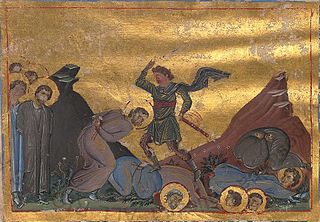Related Research Articles
Eusebius of Caesarea, also known as Eusebius Pamphilius, was a Greek Syro-Palestinian historian of Christianity, exegete, and Christian polemicist. In about AD 314 he became the bishop of Caesarea Maritima in the Roman province of Syria Palaestina.

Saint Pamphilus, was a presbyter of Caesarea and chief among the biblical scholars of his generation. He was the friend and teacher of Eusebius of Caesarea, who recorded details of his career in a three-book Vita that has been lost.
Firmilian, Bishop of Caesarea Mazaca from c. 232, was a disciple of Origen. He had a contemporary reputation comparable to that of Dionysius of Alexandria or Cyprian, bishop of Carthage. He took an active part in the mid-3rd century controversies over rebaptising heretics and readmitting lapsed Christians after the persecutions of Decius and was excommunicated by Pope Stephen I for his position. A single letter of Firmilian to Cyprian survives among Cyprian's correspondence. Jerome omits Firmilian from De viris illustribus. "To his contemporaries his forty years of influential episcopate, his friendship with Origen and Dionysius, the appeal to him of Cyprian, and his censure of Stephanus might well make him seem the most conspicuous figure of his time" (Wace).

The Diocletianic or Great Persecution was the last and most severe persecution of Christians in the Roman Empire. In 303, the emperors Diocletian, Maximian, Galerius, and Constantius issued a series of edicts rescinding Christians' legal rights and demanding that they comply with traditional religious practices. Later edicts targeted the clergy and demanded universal sacrifice, ordering all inhabitants to sacrifice to the gods. The persecution varied in intensity across the empire—weakest in Gaul and Britain, where only the first edict was applied, and strongest in the Eastern provinces. Persecutory laws were nullified by different emperors at different times, but Constantine and Licinius' Edict of Milan in 313 has traditionally marked the end of the persecution.

February 15 - Eastern Orthodox liturgical calendar - February 17
Saint Adrian travelled from Batanea to Caesarea Palaestina, where he was martyred together with Saint Eubulus. He is commemorated on 5 March; Eubulus on 7 March.

Alexander of Jerusalem was a third century bishop who is venerated as a martyr and saint by the Eastern Orthodox Church, Oriental Orthodox churches, and the Roman Catholic Church. He died during the persecution of Emperor Decius.

Romanus of Caesarea, also known as Romanus of Antioch, is venerated as a martyr. A deacon of Caesarea, he was martyred at Antioch.
Basilides and Potamiaena were Christian martyrs now venerated as saints. Both died in Alexandria during the persecutions under Septimius Severus.

Procopius of Scythopolis was a 4th century martyr who is venerated as a saint. He was a reader and exorcist in the church at Scythopolis; he also was famous as an ascetic and erudite theologian. Eusebius of Caesarea wrote of his martyrdom, which occurred during the persecution of Roman Emperor Diocletian, and stated that "he was born at Jerusalem, but had gone to live in Scythopolis, where he held three ecclesiastical offices. He was reader and interpreter in the Syriac language, and cured those possessed of evil spirits." Eusebius wrote that Procopius was sent with his companions from Scythopolis to Caesarea Maritima, where he was decapitated.
Firmilian was the Roman governor of the Iudaea Province, during the third Late Roman Period of the Roman rule over the region. He was the third of a succession of governors who enforced the Diocletian Persecution at Caesarea, the province's capital, which lasted for twelve years. He is commonly referred as cruel and sadistic for torturing and killing many Christians and being heartless even to his close allies. He was beheaded for his crimes around 310 AD, by the emperor Maximinus’s order, as his predecessor Urbanus had been two years before.
Agapius of Palestine was a Christian martyr from Gaza, beheaded along with seven others by order of Urban, governor of Palestine, in the year 303 or 304 under the Great Persecution of Diocletian. Eusebius records that Timolaus of Pontus, Dionysius from Tripolis in Phœnicia, Romulus, said to have been sub-deacon of the parish of Diospolis, Plæsius of Egypt, and two men named Alexander, one from Gaza and the other from Gazahad. These six young men bound themselves and surrendered to Urban in the hopes of becoming martyrs. They openly professed their Christianity and said that their faith made them unafraid of the wild animals of the arena. Urban had them put into prison. A few days later they were joined by two others, one a certain Dionysius, and the other Agapius, who is said to have been tortured in the past for his faith. All eight were beheaded in Caesarea Maritima on the same day.
Saint Theodosia of Tyre, according to the historian of the early Christian church Eusebius, was a seventeen-year-old girl who deliberately sought to be executed as a martyr to Christianity in the city of Caesarea in 307 AD. She was tortured, urged to reject Christianity, and, when she refused, thrown into the sea. She is commemorated on April 2.

Saints Alphaeus and Zaccheus were two Christians who were put to death in Caesarea, Palestine, in 303 or 304, according to church historian Eusebius in his Martyrs of Palestine. They are commemorated on November 18.

Saint Timolaus and five companions, according to the historian of the early Christian church Eusebius in his Martyrs of Palestine, were young men who, having heard that the Roman authorities in Caesarea, Palestine, in 303 AD, had condemned a number of Christians to die by being thrown to wild beasts in the public arena, came before the governor of their own volition with their hands tied behind their backs and demanded to join their fellow Christians in that martyrdom. They were not however thrown to wild beasts but decapitated along with two other men who were already in prison.
Patermutius was an early Christian martyr. A layman, Patermutius was one of four Christians who led Mass for the persecuted Christians condemned to work in the Palestinian quarries in the wake of the Diocletianic Persecution. When the Roman emperor Galerius learned of this, he had Patermutius burned alive along with the other leaders, and the Christians dispersed to mines in Cyprus and Lebanon. He is venerated as a saint in the Roman Catholic Church and Eastern Orthodox Church.
The Martyrs of Alexandria under Decius were a number of Christians who were martyred in Alexandria, Egypt, under the Roman Emperor Decius . Their feast day is 30 October.
Saints Meuris and Thea were two Christian women who were martyred at Gaza, Palestine. Their feast day is 19 December.

Saint Nemesion was an Egyptian martyr in Alexandria, Egypt during the persecutions of Christians by the Roman emperor Decius. A group of other Christians were martyred at the same time. His feast day is 19 December, or 10 September in some calendars.
Saint Ulphianus was a Christian martyr in Palestine. His feast day is 3 April.
References
- 1 2 St. Elias & Companions — Catholic Online
- ↑ Charles Fell, Richard Challoner (1750), The Lives of Saints, pp. 176–177
- 1 2 "SS. Elias, Jeremy, Isaias, Samuel, Daniel, and Other Holy Martyrs at Caesarea, in Palestine. February 16. Rev. Alban Butler. 1866. Volume II: February. The Lives of the Saints". www.bartleby.com. Retrieved 2018-03-17.
- ↑ St. Elias, Jeremy, and Companions — Catholic Online
- ↑ Saint of the Day, February 16: Elias, Jeremy, Isaias, Samuel, and Daniel Archived 2014-08-07 at the Wayback Machine at SaintPatrickDC.org. Retrieved 2012-03-06.
